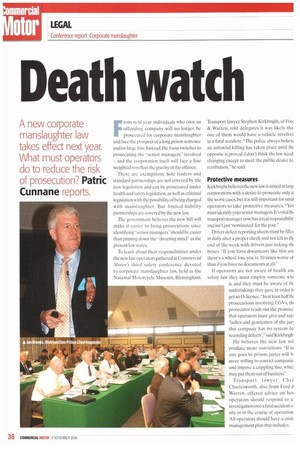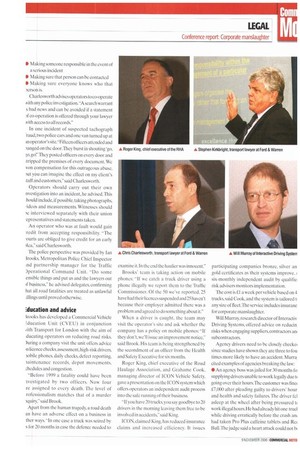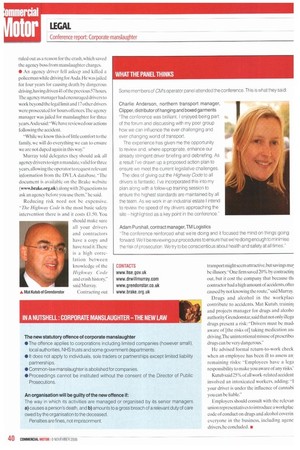Death watch
Page 38

Page 39

Page 40

If you've noticed an error in this article please click here to report it so we can fix it.
A new corporate manslaughter law takes effect next year.
What must operators do to reduce the risk of prosecution? Patric
Cunnane reports. From next year individuals who own an offending company will no longer be prosecuted for corporate manslaughter and face the prospect of a long prison sentence and/or large line. Instead, the focus switches to prosecuting the "senior managers" involved — and the corporation itself will face a fine weighted to reflect the gravity of the offence.
There are exemptions. Sole traders and standard partnerships are not covered by the new legislation and can be prosecuted under health and safety legislation,as well as criminal legislation with the possibility of being charged with manslaughter. But limited-liability partnerships are covered by the new law.
The government believes the new bill will make it easier to bring prosecutions since identifying"senior managers" should he easier than pinning down the "directing mindas the present law states.
To learn about their responsibilities under the new law.operators gathered at commercial Motor's third safety conference devoted to corporate manslaughter law, held at the National Motorcycle Museum, Birmingham.
Transport lawyer Stephen Kirkbright, of For & Warren, told delegates it was likely tha one of them would have a vehicle involve( in a fatal accident. "The police always believ( an unlawful killing has taken place until th( opposite is proved. 1 don't think the law need changing except to meet the public desire fo retribution," he said.
Protective measures
Kirkbright believes the new law is aimed at lug( corporations with a desire to prosecute only ii the worst cases, but it is still important for smal operators to take protective measures. "You must identify your senior managers. It's vital thi transport manager now has a real responsibil it; and isn't just 'nominated' for the post."
Driver defect reporting sheets must be Me( in daily after a proper check and not left to du end of the week with drivers just ticking thi boxes. "If you have documents like this an there's a wheel loss, you're 10 times worse of than if you have no documents at all."
If operators are not aware of health an safety law they must employ someone wh( is, and they must he aware of thi undertakings they gave in order t( get an 0-licence. "In at least half till prosecutions involving L0Vs, thi
prosecutor reads out the promise that operators must give and say
'ladies and gentlemen of the jut:: this company has no system fo recording defects'," said Kirkbrigh He believes the new law wil produce more convictions: "If ni one goes to prison, juries will h. more willing to convict companie and impose a crippling fine, whicl may put them out of business."
Transport lawyer Chri Charlesworth, also from Ford Warren, offered advice on ho‘ operators should respond to a: investigation into a fatal amident o site or in the course of operation All operators should have a crisis management plan that includes:
ID Making someone responsible in the event of a serious incident
D Making sure that person can be contacted
D Making sure everyone knows who that Jerson is.
Charlesworth advises operators to co-operate with any police investigation. "A search warrant s bad news and can be avoided if a statement A co-operation is offered through your lawyer ith access to all records."
In one incident of suspected tachograph 'raud, two police cars and one van turned up at in operator's site."Fifteen officers attended and )anged on the door. They burst in shouting'go, ;o, go! They posted officers on every door and ;tripped the premises of every document. We von compensation for this outrageous abuse. nit you can imagine the effect on my client's itaff and customers." said Charlesworth.
Operators should carry out their own nvestigation into an incident, he advised. This ,hould include, if possible. taking photographs, ideos and measurements. Witnesses should )e. interviewed separately with their union .epresentatives and statements taken.
An operator who was at fault would gain :redit from accepting responsibility. "The nuns are obliged to give credit for an early ilea." said Charlesworth.
The police perspective was provided by Ian 3rooks, Metropolitan Police Chief Inspector ind partnership manager for the Traffic )perational Command Unit. "Do some ensible things and put us and the lawyers out if business." he advised delegates, confirming hat all road fatalities are treated as unlawful .illings until proved otherwise.
iducation and advice
irooks has developed a Commercial Vehicle 7.ducation Unit (CVEU) in conjunction vith Transport for London with the aim of dueating operators on reducing road risks. )uring a company visit the unit offers advice licence checks, assessment, high-risk drivers, lobile phones, daily checks, defect reporting, lain tenance records, depot movements, chedules and congestion.
"Before 1999 a fatality could have been ivestigated by two officers. Now four re assigned to every death. The level of rofessionalism matches that of a murder iquiry," said Brook.
Apart from the human tragedy, a road death an have an adverse effect on a business in ther ways. "In one case a truck was seized by s for 20 months in case the defence needed to
examine it. In the end the haulier was innocent."
Brooks' team is taking action on mobile phones: -If we catch a truck driver using a phone illegally we report them to the Traffic Commissioner. Of the 50 we've reported, 25 have had their licencessuspended and 25 haven't because their employer admitted there was a problem and agreed to do something about it."
When a driver is caught, the team may visit the operator's site and ask whether the company has a policy on mobile phones: "If they don't, we'll issue an improvement notice." said Brook. His team is being strengthened by the secondment of an officer from the Health and Safety Executive for six months.
Roger King. chief executive of the Road Haulage Association, and Grahame Cook, managing director of ICON Vehicle Safety, gave a presentation on the ICON system which offers operators an independent audit process into the safe running of their business.
-If you have 20 t rucks, you say goodbye to 20 drivers in the morning leaving them free to be involved in accidents," said King.
ICON, claimed King, has reduced insurance claims and increased efficiency. It issues
participating companies bronze, silver an gold certificates as their systems improve. / six-monthly independent audit by qualifie, risk advisers monitors implementation.
The cost is .€1 a week per vehicle based on 4 trucks, said Cook, and the system is tailored t, any size of fieet.The service includes insuranc for corporate manslaughter.
Will Murray. research director of Interactiv Driving Systems, offered advice on reducin, risks when engaging suppliers, contractors ani subcontractors.
Agency drivers need to he closely checkei since studies have shown they are three to fou times more likely to have an accident. Murra: cited examples of agencies breaking the law:
• An agency boss was jailed for 30 months fo supplying drivers unable to work legally due t, going over their hours. The customer was finei 0,000 after pleading guilty to drivers' hour and health and safety failures. The driver fel asleep at the wheel after being pressured tt work illegal hours. He had already hit one trucl while driving erratically before the crash an had taken Pro Plus caffeine tablets and Re( Bull.The judge said a heart attack could not IN
ruled out as a reason for the crash, which saved the agency boss from manslaughter charges.
• An agency driver fell asleep and killed a policeman while driving for Asda. He was jailed for four years for causing death by dangerous driving,havingdriven 41 of the previous57 hours. The agency manager had encouraged drivers to work beyond the legal limit and 17 other drivers were prosecuted for hours offences.The agency manager was jailed for manslaughter for three years.Asda said:"We have reviewed our actions following the accident.
"While we know this is of little comfort to the family, we will do everything we can to ensure we are not duped again in this way" Murray told delegates they should ask all agency drivers to sign a mandate,valid for three years. allowing the operator to request relevant information from the DVLA database. "The document is available on the Brake website (www.brake.org.uk) along with 20 questions to ask an agency before you use them." he said.
Reducing risk need not he expensive.
"The Highway Code is the most basic safety intervention there is and it costs £1.50. You should make sure all your drivers and contractors have a copy and have read it.There is a high correlation between knowledge of the Highway Code and crash history," said Murray.
• Mat Kutub of Grendonstar Contracting out
transport might seem attractive, but savings ma! he illusory."One firm saved 20% by contractim out, but it cost the company that because thi contractor hada high amount of accidents,oftel caused by not knowing the route." said Murray.
Drugs and alcohol in the workplaci contribute to accidents. Mat Kutub, trainim and projects manager for drugs and alcoho authority Grendonstar,said that not only illega drugs present a risk: "Drivers must be mad' aware of [the risks of] taking medication am driving.The unintentional misuse of prescribe( drugs can be very dangerous."
He advised formal return-to-work check when an employee has been ill to assess an remaining risks: "Employees have a lega responsibility to make you aware of any risks.'
Kutub said 25% of all work-related accident involved an intoxicated workers, adding: "I your driver is under the influence of can nabi you can be liable."
Employers should consult with the relevan union representatives to introduce a workplac code of conduct on drugs and alcohol coverin everyone in the business, including agenc drivers, he concluded. •






























































































































































































